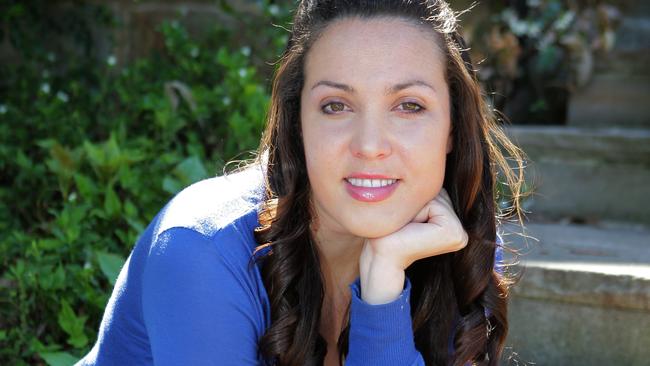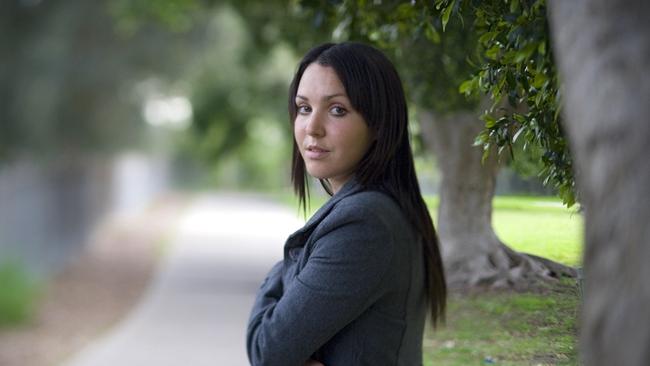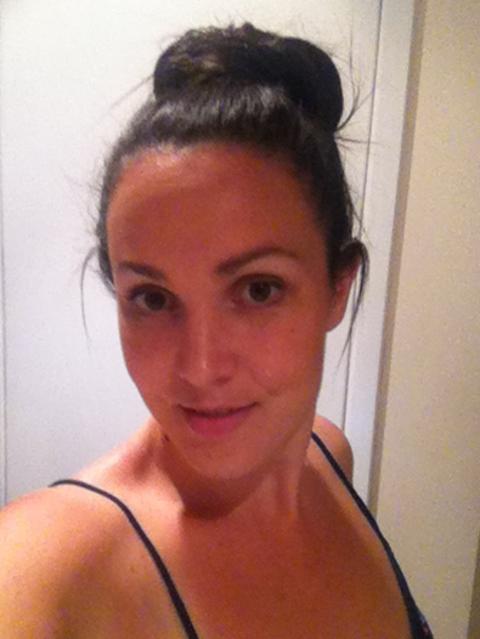Don’t ask me to feel sorry for my rapist
I was metres from my front door when a man I’d never seen before held a box-cutter blade to my throat and dragged me to a park. The only reason I fought back was because I had nothing to lose.

Rendezview
Don't miss out on the headlines from Rendezview. Followed categories will be added to My News.
Content warning: this article includes a graphic description of sexual violence
Nine years ago I threatened to kill a man. I did not know his name or anything about him. And yet when I threatened to kill him, I meant it.
To this day I still wonder what would have happened if, by some fluke, the box-cutter had made its way into my own hand.
I wonder if I would have pressed the cold blade against his throat, as he had done to me just moments prior. I wonder if I would have found it in me to stab him as he lay there on top of me, strangling me, bashing me, indecently sexually assaulting me.
I still don’t know.
What I do know is that by threatening to end his life, I saved my own.
I know that if I hadn’t wrestled him for the box-cutter, if I hadn’t screamed and kicked and thrashed about like a wounded animal, I might not have survived the night.
I do not say this to imply that women who have acted any differently in sexual assault situations have done the wrong thing. On the contrary, a different perpetrator might have killed me on the spot for fighting.
So my story is neither cautionary nor instructive. It’s just my story and there is no way to tell it without including certain details.
I was 23-years-old and an honours student at the University of Sydney. I’d woken up that morning and showered like I would have on any other day. The only thing that was different about this particular morning was that it was the day of my honours presentation — a day I had been working towards for months. It should have ended in celebration and elation.
Instead it ended with me at a police station.
I’d gone out for some drinks after class had finished (yes, I was drinking, as women are permitted to do from time to time) and I was making the 20 minute walk home to my parent’s place in Sydney’s lower north shore.
I was a few hundred metres from my front door when I was suddenly attacked from behind.
A solid-built man I had never seen before had seized me. He held a box-cutter blade to my throat and began dragging me into an adjacent park.
I didn’t see or hear him coming as I was listening to music from earphones. (Later I would be told that this was just one of the many reasons why I was to blame for his decision to attack.)
He then said point blank: “I am going to kill you”.
He punched me in the face and the force of the blow was so powerful that it knocked me off my feet and onto my back.
I lay in the dirt, immobilised by fear, as he moved on top of me. They call this the “freeze response” and I have since learnt that most sexual assault victims experience this sort of shock and paralysis.
Then I felt the life being choked out of me. His hand was on my throat, my trachea was being crushed, and I could taste blood in my mouth. I was also vaguely aware of a deep pain beginning to grow in my shoulders and back.
Hours later at Gladesville police station I’d be photographed and swabbed. I’d be asked to go into a small room and remove my top. Once in there, I would examine my body in the mirror and find what would soon become dark bruising across my back — bruising that was apparently caused by large, protruding tree roots that had been grinding into my back while the weight of my attacker’s body pushed my flesh into them.

During the assault though, I didn’t process that sort of detail. All I could think was “How can this be happening to me? Is this for real?”
Then my mind went somewhere else altogether. I shut my eyes tight and an old, forgotten memory played like a video before my eyes. I remembered being a young girl, maybe six or seven years in age. I was standing in that same park and I was watching my older brother play soccer on the field. I remembered how at half time, I’d eaten quartered oranges with him and it had made me feel special that he’d included me and talked to me with his older friends around.
That was it. That was the simple memory that I shut my eyes and held on to. It seems odd, doesn’t it? That a man is trying to rape and kill you and you think about eating quartered oranges with your big brother.
I’ve since been told that my brain was valiantly trying to protect me from the trauma of what was occurring to me. In transporting me to another time and place — a safer time and place — it was trying to shield me from what was happening.
And yet, just as quickly as I’d slipped into that dissociative state, I slipped back out of it again. And when I did, I found myself looking directly into my attacker’s face which was only inches away from my own.
His grasp was still on my throat. I couldn’t breathe and couldn’t move. I felt a sharp pain across my body and I remember thinking: “I don’t want to die. Not like this”.

****
When it comes to sexual assault, women are forever being asked “why didn’t you say no?” or “why didn’t you fight back?”
As though a rapist would ever listen.
As though victims are the ones who should be responsible for preventing the violence we experience.
If you really want to know why most women don’t fight back, it’s because of one of two things: we are either immobilised by fear, or we assume that fighting back will make things worse. This is, after all, something that has been drummed in to us all from a very tender age.
But that night I did fight back, not at first, and not because I am courageous. The only reason I fought was because adrenaline took over and I had nothing to lose.
My mind had eventually caught up and computed that I was in a kill-or-be-killed situation. And if I was going to die anyway, why not fight the f***er? Get his DNA if nothing else.
I began thrashing and resisting, and then I exploded yelling “I’m going to kill you first”.
In for a penny, in for a pound.
I’ll never forget the look of shock and surprise on his face when I said that. What I don’t remember, is exactly what happened in the next few moments.
Again, this is not uncommon. The nature of trauma means that survivors often have memory gaps or recollections that don’t add up. One counsellor explained that if your memory is like a filing cabinet system, a traumatic event will effectively toss all the files onto the floor, mess them around, and then shove them back in.
Some files get lost. Others get out of order.
She also told me that she’s never once met a sexual assault survivor who had perfect, chronological recall.
Such is the nature of trauma.
And yet I’ve also been told that if I ever do go to court, defence lawyers will almost certainly try to use my memory gaps against me.
I can look forward to some smug lawyer arrogantly trying to discredit me by painting me as an “unreliable witness”. The fact that I’m even classified as a “witness” frustrates me to tears. I wasn’t sitting outside my body, eating popcorn watching this happen from the sidelines. It was painful. It hurt. I didn’t “witness” violence, I endured it.
I’ve also been advised that in addition to my memory gaps, the fact that I had been drinking that night will almost certainly be used against me.
I’ll be painted as licentious. As slutty. As stupid. As a liar.
But to be very clear, my memory gaps are not evidence that I am lying. To the contrary, they are evidence of the traumatic nature of the violence I have experienced.
So here is what I do remember from that point on. I remember a sudden feeling of lightness on my chest and an awareness that there wasn’t a heavy body on me anymore. I have no recollection of climbing to my feet but I do remember being in a standing position and noticing a small amount of blood on my hand. I remember wondering if it was my blood or his (this would later turn out to be a defensive wound.) Then I remember picking up my bag and reaching for my mobile and dialling triple 0.
****
I wasn’t technically raped that night. And boy do people love to remind me of that.
“I know what happened is bad and all, but he didn’t actually, you know, get it up you, did he?”
This was the question put to me by a male manager at my casual job, a week after the assault took place. My bruises hadn’t even disappeared but the implication was clear: if there’s no P-in-V, it’s not so bad, is it?
Sure, I’d been indecently sexually assaulted, physically assaulted, strangled, told I would be killed, and held at blade point. But in a phallocentric world, sexual violence isn’t measured by the trauma the victim experiences, but by the perpetrator’s assessment of the event: and if the penis didn’t get its way? Then what right should I have to expect the same supports and police resourcing that a “real rape victim” would get?
This wasn’t the only insensitive comment people made.
“You’re a pretty girl, you know. You could take it as a compliment that he selected you.” (This piece of unsolicited advice was kindly offered by a female journalist working for a women’s magazine).
“You have to admit Nina, you were pretty stupid for walking home alone”. (This gem was offered by an old friend I went to school with.)
One woman asked in all seriousness: “Do you ever think this might not have happened if you had a closer relationship with God?”
Another woman took the time and trouble to email me to inform me that she had real pity for me until, that was, she learnt that I had been “doing all the wrong things”.
Since then, I’ve been told it’s my fault for drinking. My fault for listening to music. My fault for travelling alone (as though women should only ever venture out in public if they are in the company of a chaperone).
People have called me a liar and an attention seeker.
I’ve had one stranger persistently request that I share the police photos taken that night with him.
I’ve had other strange men send me messages of sympathy, immediately followed up with a sunny little dick-pic. For condolence, I guess. (No, I do not want to commiserate with your boner).
I’ve had schools ask me if I will come speak to their female students about the “risky situations” that women put themselves in (no, I won’t, don’t ask me again).
I’ve been asked whether the problem lies in girls “not respecting themselves” (and here I was thinking that my assault happened because my attacker has no respect for women, for me, or for my right to live a life free of sexual violence.)
I’ve also had someone suggest that the poor guy probably “just had no money, otherwise he would have gone to a prostitute”. As though sexual violence isn’t about power and control at all, but a man’s simple desire to have certain sexual needs met.
Over and over I have been asked the questions that so many other survivors have also been asked: “What were you wearing? How much did you have to drink? Don’t you know how stupid you were being?”
And each and every one of these questions (and so many more) serve to silence women. They do this by deflecting attention away from the actions and choices of perpetrators, and by insinuating that women are responsible for the violence we have experienced.
And finally there was this remark made by some clever chap who wanted to discuss my attack online:
“What a conceited bitch for thinking she’s even worthy of rape. The guy just probably wanted to give her a good bashing in which case job well done.”
Charming stuff, isn’t it?
Of course, this is only a fraction of what women deal with when we speak out publicly about sexual violence. And in many ways my own assault was easier to speak out about than many others. That’s because I was assaulted by a stranger and there was physical violence involved. But most victims aren’t assaulted by strangers and rarely are there physical signs of violence, and this makes it even harder to be believed.
And this is why so women stay silent. Why so many choose not to report.
It’s also why perpetrators feel so entitled to keep on offending: because our society continually affirms for them that women are in the wrong. That women are untrustworthy. That stranger-danger rape is the only “legitimate rape”. That women make-up sexual abuse in order to assuage sexual regret. That the word of a man is worth far more than the word of woman.
Over the last week I, along with so many others, have read the extraordinary victim impact statement made by the young woman who was raped by Brock Turner behind a dumpster at Stanford University.
Her words resonate deeply.

In addition to exposing the systemic victim-blaming that occurs when survivors disclose, she has also elucidated all the ways that perpetrators attempt to minimise responsibility, shift blame and discredit victims.
Her analysis of how some media will humanise perpetrators (by including references to their skills, hobbies or interests) while reducing victims to nothing more than invisible, silent “others” is equally compelling.
And in her words so many survivors the world over have found recognition and comfort. They’ve also found the courage to speak out and own their status as survivor.
I suspect this is because she is radically rewriting ideas about victimhood.
In the cultural conscience, victims are often presented as broken, voiceless and downtrodden. At best, we are pitied. At worst, we are despised and devalued as “damaged goods”.
Yet though her victim impact statement she has debunked those stereotypes and advanced a new image of a survivor who is intelligent, articulate, analytical, insightful, bold, brave, reflective and persuasive.
Her words are resilient, strong, and hopeful. She reminds me that even though my assailant has never been caught, and even though I am yet to have my day in court, recovery and hope is possible, and above all, I am not alone.
Nina Funnell is a journalist, author, and advocate against gender based violence. In 2010 Nina was awarded the Australian Human Rights Community (Individual) award for her work in sexual assault advocacy.
If you or someone you know has been impacted by sexual violence, support is available at 1800 RESPECT.
Find more RendezView here
On Facebook
And Twitter



